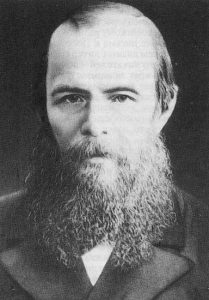 Dostoyevsky was the second son of a former army doctor. He was educated at home and at a private school. Shortly after the death of his mother in 1837 he was sent to St. Petersburg, where he entered the Army Engineering College. Dostoyevsky’s father died in 1839, most likely of apoplexy, but it was rumored that he was murdered by his own serfs. Dostoyevsky graduated as a military engineer, but resigned in 1844 to devote himself to writing. His first novel, Poor Folk appeared in 1846.
Dostoyevsky was the second son of a former army doctor. He was educated at home and at a private school. Shortly after the death of his mother in 1837 he was sent to St. Petersburg, where he entered the Army Engineering College. Dostoyevsky’s father died in 1839, most likely of apoplexy, but it was rumored that he was murdered by his own serfs. Dostoyevsky graduated as a military engineer, but resigned in 1844 to devote himself to writing. His first novel, Poor Folk appeared in 1846.
That year he joined a group of utopian socialists. He was arrested in 1849 and sentenced to death, commuted to imprisonment in Siberia. Dostoyevsky spent four years in hard labor and four years as a soldier in Semipalatinsk, a city in what it is today Kazakhstan.
Dostoyevsky returned to St. Petersburg in 1854 as a writer with a religious mission and published three works that derive in different ways from his Siberia experiences: The House of the Dead , (1860) a fictional account of prison life, The Insulted and Injured, which reflects the author’s refutation of naive Utopianism in the face of evil, and Winter Notes on Summer Impressions, his account of a trip to Western Europe.
In 1857 Dostoyevsky married Maria Isaev, a 29-year old widow. He resigned from the army two years later. Between the years 1861 and 1863 he served as editor of the monthly periodical Time, which was later suppressed because of an article on the Polish uprising.
In 1864-65 his wife and brother died and he was burdened with debts. His situation was made even worse by his gambling addiction. From the turmoil of the 1860s emerged Notes from the Underground, a psychological study of an outsider, which marked a major advancement in Dostoyevsky’s artistic development.
In 1867 Dostoyevsky married Anna Snitkin, his 22-year old stenographer. They traveled abroad and returned in 1871. By the time of The Brothers Karamazov (1879-80), Dostoyevsky was recognized in his own country as one of its great writers.
Books

Notes From the Underground
Dostoevsky’s most revolutionary novel, Notes from Underground marks the dividing line between nineteenth- and twentieth-century fiction, and between the visions of self each century embodied. One of the most remarkable characters in literature, the unnamed narrator is a former official who has defiantly withdrawn into an underground existence. In full retreat from society, he scrawls a passionate, obsessive, self-contradictory narrative that serves as a devastating attack on social utopianism and an assertion of man’s essentially irrational nature.
Richard Pevear and Larissa Volokhonsky, whose Dostoevsky translations have become the standard, give us a brilliantly faithful edition of this classic novel, conveying all the tragedy and tormented comedy of the original.

Crime and Punishment
Raskolnikov, an impoverished student living in the St. Petersburg of the tsars, is determined to overreach his humanity and assert his untrammeled individual will. When he commits an act of murder and theft, he sets into motion a story that, for its excruciating suspense, its atmospheric vividness, and its depth of characterization and vision is almost unequaled in the literatures of the world. The best known of Dostoevsky’s masterpieces, Crime and Punishment can bear any amount of rereading without losing a drop of its power over our imaginations.
Dostoevsky’s drama of sin, guilt, and redemption transforms the sordid story of an old woman’s murder into the nineteenth century’s profoundest and most compelling philosophical novel.
Award-winning translators Richard Pevear and Larissa Volokhonsky render this elusive and wildly innovative novel with an energy, suppleness, and range of voice that do full justice to the genius of its creator.
What is hell? I maintain that it is the suffering of being unable to love.
Man only likes to count his troubles; he doesn’t calculate his happiness.
Above all, don’t lie to yourself. The man who lies to himself and listens to his own lie comes to a point that he cannot distinguish the truth within him, or around him, and so loses all respect for himself and for others. And having no respect he ceases to love.
I say let the world go to hell, but I should always have my tea.
Pain and suffering are always inevitable for a large intelligence and a deep heart. The really great men must, I think, have great sadness on earth.
To go wrong in one’s own way is better than to go right in someone else’s.

